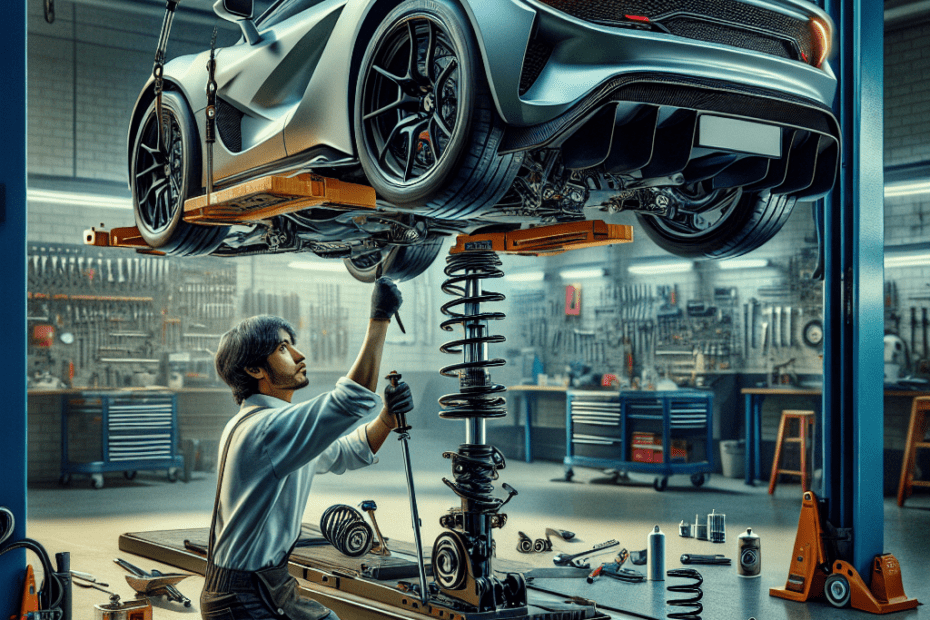Introduction
When they want to improve their car’s performance, many people think about upgrading the engine or adding a turbocharger. However, one of the most important factors in making a car handle better is the suspension system. Upgrading a car’s suspension can make it more stable, enhance handling, and improve ride quality. People who are interested in how to upgrade their car suspension can find several ways to make their driving experience smoother and more fun.
Understanding Your Car’s Suspension System
Before diving into how to upgrade their car’s suspension, it is crucial for car enthusiasts to understand what the suspension system does. The suspension system supports the vehicle’s weight, absorbs and dampens road shocks, and helps maintain tire contact with the road. The main components include springs, shock absorbers, struts, and stabilizer bars.
Deciding on Your Suspension Goals
It’s important for car owners to decide what they want their upgraded suspension to achieve. Are they looking for improved handling for regular street driving, or do they want peak performance for track racing? Understanding the goal helps in choosing the right parts for the suspension upgrade.
| Upgrade Type | Ideal For | Pros | Cons |
|---|---|---|---|
| Coilovers | Track racing and adjustable height | Improved handling, adjustable ride height | Costly, may reduce comfort |
| Lowering Springs | Better street performance | Enhanced grip, sportier look | Can compromise comfort |
| Air Suspension | Variable ride height and comfort | Adjustable comfort, improved ride quality | Expensive, complex system |
Popular Suspension Upgrade Options
Many opt for coilovers when choosing to upgrade their car’s suspension. According to a performance vehicles report, more than 50% of car enthusiasts prefer coilovers due to their adjustable nature (MarketWatch). Coilovers allow drivers to adjust their car’s ride height and stiffness, which can be useful for varying road conditions and racing scenarios. For those looking for a cost-effective option, lowering springs can improve handling by altering the car’s center of gravity.
The Importance of Quality Parts
It’s critical for drivers to select high-quality parts when upgrading their suspension. Cheap or incompatible components can lead to problems such as poor vehicle handling and increased wear on other suspension components. Experts suggest purchasing from reputable brands to ensure reliability and safety.
Installation Costs and Considerations
Upgrading a suspension system isn’t just about buying the parts. Installation fees and potential additional modifications should also be considered. Depending on the complexity, installation costs can range from $500 to $2000. They should do thorough research or consult professionals to get accurate estimates for the entire project.
Testing and Adjustments
Once the upgrade is complete, it is important for them to test their car on different road surfaces to understand the new dynamics. The beauty of some suspension solutions, like coilovers, lies in their adjustability, which lets them fine-tune their setup to match their driving style and needs.
Key Takeaways
- A car’s suspension is vital for handling and comfort.
- Decide whether you want better street handling or track performance.
- Consider coilovers for adjustability and lowering springs for cost-effective handling improvements.
- Always opt for high-quality parts to ensure safety and durability.
- Account for both parts and installation costs in your budget.
- Test and adjust settings for optimal performance after installation.
FAQ
- What is the main benefit of upgrading my car suspension?
Upgrading your suspension can significantly improve handling, ride comfort, and safety.
- Can I upgrade my suspension by myself?
While some people may choose DIY installations, professional help is recommended for accuracy and safety.
- How often should I replace suspension components?
It largely depends on your driving style and road conditions but typically every 50,000 to 100,000 miles.
- Are there any downsides to a stiffer suspension?
A stiffer suspension can improve handling but might reduce ride comfort on bumpy roads.
- What is the difference between coilovers and air suspension?
Coilovers provide adjustable height and stiffness, whereas air suspension allows for variable ride height and often better comfort.
